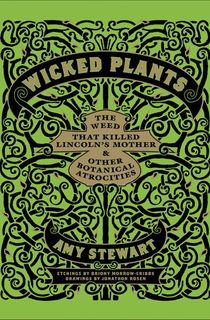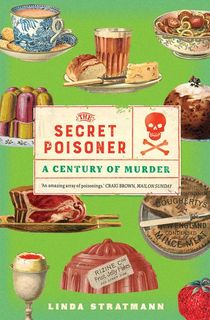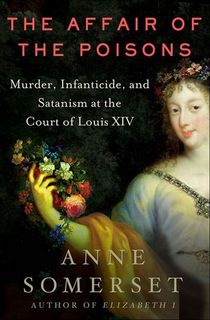For many people, especially murder mystery readers, poison holds a special fascination. There’s something oddly compelling about the idea that a few drops of something can incapacitate a person or even kill them. There are tons of English idioms involving poisons—“poison pill,” “pick your poison,” “poison pen,” showing a colloquial use of the word in everyday speech.
Last year in an interview with Murder & Mayhem, when asked why he thought people were so interested in poisons, Dr. Neil Bradbury, professor, scientist, and writer, said, “Most of us grew up with the stories of Snow White eating the poisoned apple. I think there's that kind of almost cultural curiosity.”
For murder mystery readers, we've put together a list of eight non-fiction books about poison—exploring everything from Agatha Christie’s relationship to poisons, to poisonous plants and the use of poison in the Jazz Age or 17th century France. Prepare to be amazed at the vast history and influence of poison.

A is for Arsenic: The Poisons of Agatha Christie
Agatha Christie is known as the Queen of Crime but she’s also known for her incredible knowledge of poisons. In Harkup’s book, she explores Christie's professional expertise with poisons, working in a pharmacy during the wars. Each chapter focuses on a different poison and a corresponding Christie novel or short story with a breakdown of how the poison works on the body and the antidotes for it (if any). Of course, it includes the big three, Cyanide, Arsenic and Strychnine. Great book for Agatha Christie fans!

A Taste for Poison
In this work, Dr. Neil Bradbury dives into the world of poisons from both true crime and scientific perspectives. Each chapter is dedicated to a different poison where Dr. Bradbury explores the use of the poison in crime cases from the distant past to the present day. He also presents the most readable explanation of how each poison works on the body in terrifying ways. Strychnine seems truly the worst way to go! The book really demonstrates how poison is really a matter of dosage and that one man’s poison is another man’s antidote (you’ll also learn that many antidotes are often poisons themselves). Read our interview with Dr. Neil Bradbury here.

Wicked Plants
In this delightful book, Stewart explores the plant world through the lens of “wickedness”—plants that can make you sick or die. (There’s also some attention paid to plants that can make you high or intoxicated but that’s a little different). It’s a bit of an encyclopedia of “wickedness”; Entries have delightful little drawings to accompany many of the entries. You’ll discover that the most ordinary of flowers and plants have the power to hurt humans. It’ll make you realize how houseplants are little potted plants of poison.

Poison: The History of Potions, Powders and Murderous Practitioners
This book dives into the history of poison from Ancient Rome to the present day. It has a wider historical focus than other books, giving readers a sense of popular poisons of the historical age with glossy photos and illustrations. It also spends more time exploring the poisoners themselves including Cleopatra and the infamous Lucretia Borgia.
Related: 13 Riveting Reads for Mystery Fans and History Buffs Alike

The Secret Poisoner
Moving away from books exploring individual poisons (and plants), Linda Stratmann dives into the history of poison detection with a focus on the Victorian era. The history of figuring out how to detect poisons is fascinating in its own right as scientists get very creative trying to find some of the more elusive poisons.

The Poisoner's Handbook: Murder and the Birth of Forensic Medicine in Jazz Age New York
Deborah Blum’s book takes a step forward in time with an exploration of poison detection in the Jazz Age. Including cases like Barnum and Bailey’s Blue Man, poisoned pies, and more, two forensic scientists Charles Norris and Alexander Gettler try to get to the bottom of these baffling cases with the backdrop of Prohibition where people are making their own alcohol at home. A good book for people interested in poison as well as crime detection.
Related: Crime and No Punishment in Prohibition-Era New York

The Affair of the Poisons
Love affairs, women offing their lovers or the people who get in their way, the pomp and circumstance of 17th century France? What else can you ask for? This book explores a particularly fascinating period of history when poisoning seemed endemic in France. When people think King Louis XIV is at risk for being murdered, he sets up a special commission to stop these nefarious crimes. High profile figures are suspected for using poison and participating Satanic rituals. This nonfiction book brings to life a very curious time in France’s history.
Related: Europe’s Most Thrilling Crime Dramas

The Elements of Murder: A History of Poison
Emsley dives into the history of five poisons—arsenic, mercury, thallium, antimony, and lead—to answer some of our biggest questions in history like how did Rasputin survive? Why did King George III go mad? He’ll also talk about environmental accidents that result in resources being poisoned as well. Poison is more than just personal; it's endemic in many communities thanks to polluters. He brings to life how these mere molecules may have had a big impact on history, even if they didn’t kill their victims.
Related: 11 Historical Mystery Books





